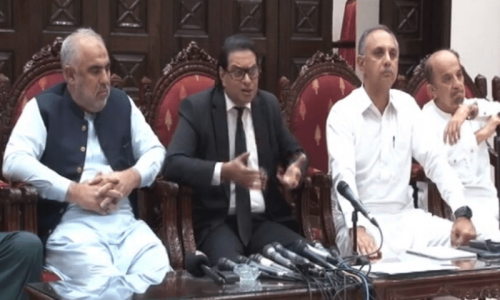ISLAMABAD, Feb 12: One of the judges on the Supreme Court bench hearing the case of Sharif brothers’ eligibility to contest elections said on Thursday the high court could intervene to block a defaulter from contesting in an election whenever the matter was brought to its notice by any source.
“Clearly under the Representation of the People’s Act (RPA) 1976, the scope of raising objections could not be limited to the financial institutions in loan default matters and any third person can file objections against any contestant,” Justice Sheikh Hakim Ali observed while hearing the Sharif brothers’ eligibility case.
The bench comprising Justice Mohammad Moosa K. Leghari, Justice Syed Sakhi Hussain Bukhari and Justice Sheikh Hakim Ali had taken up the appeals of the federal government against June 23, 2008, Lahore High Court (LHC) order of disqualifying PML-N leader Nawaz Sharif from a by-election for being convicted under the plane conspiracy case.
Punjab Advocate-General Khwaja Haris who is representing the Punjab government argued that Khurram Shah, who had challenged the nomination of the Sharifs was not competent to object because under the relevant laws in a bank default case only financial institutions could come question the electoral eligibility of a loan defaulter.
However, Advocate Ahmed Raza Qasuri, representing Khurram Shah, pointed out that the contention of the advocate general could not be accepted as in that case rival contestants could enter into an underhand deal not to challenge the nomination papers of each other. Therefore, the scope of objection is not limited.
At one point, Mr Qasuri accused that liabilities of about six billion were still outstanding against the Sharif brothers’ but the advocate-general asked the counsel to give a single example of outstanding cases in which the Sharifs had been convicted.
Justice Ali asked Advocate Qasuri to note the assertion because he would have to answer this in his arguments.
Citing Section 5A of the RPA 1976, Khwaja Haris said that apparently the intent of the legislature behind the law was that the election process should be completed within a certain period and that any dispute about disqualification of a candidate should end within the prescribed period.
After the election process is over, any aggrieved person can approach the high court through a fresh petition to challenge the position of the successful candidate by filing an application of co-warrantor.
Justice Ali again explained that the intention of the legislation was to block the entry of disqualified persons in the election process.
Conceding, Khawaja Haris said that still this had to be done within a timeframe so that elections were not halted.
Meanwhile, a private citizen Shahid Orakzai moved an application before the Supreme Court requesting it to include him as a party and allow him to explain the law of recuse under the Islamic law.












































Dear visitor, the comments section is undergoing an overhaul and will return soon.